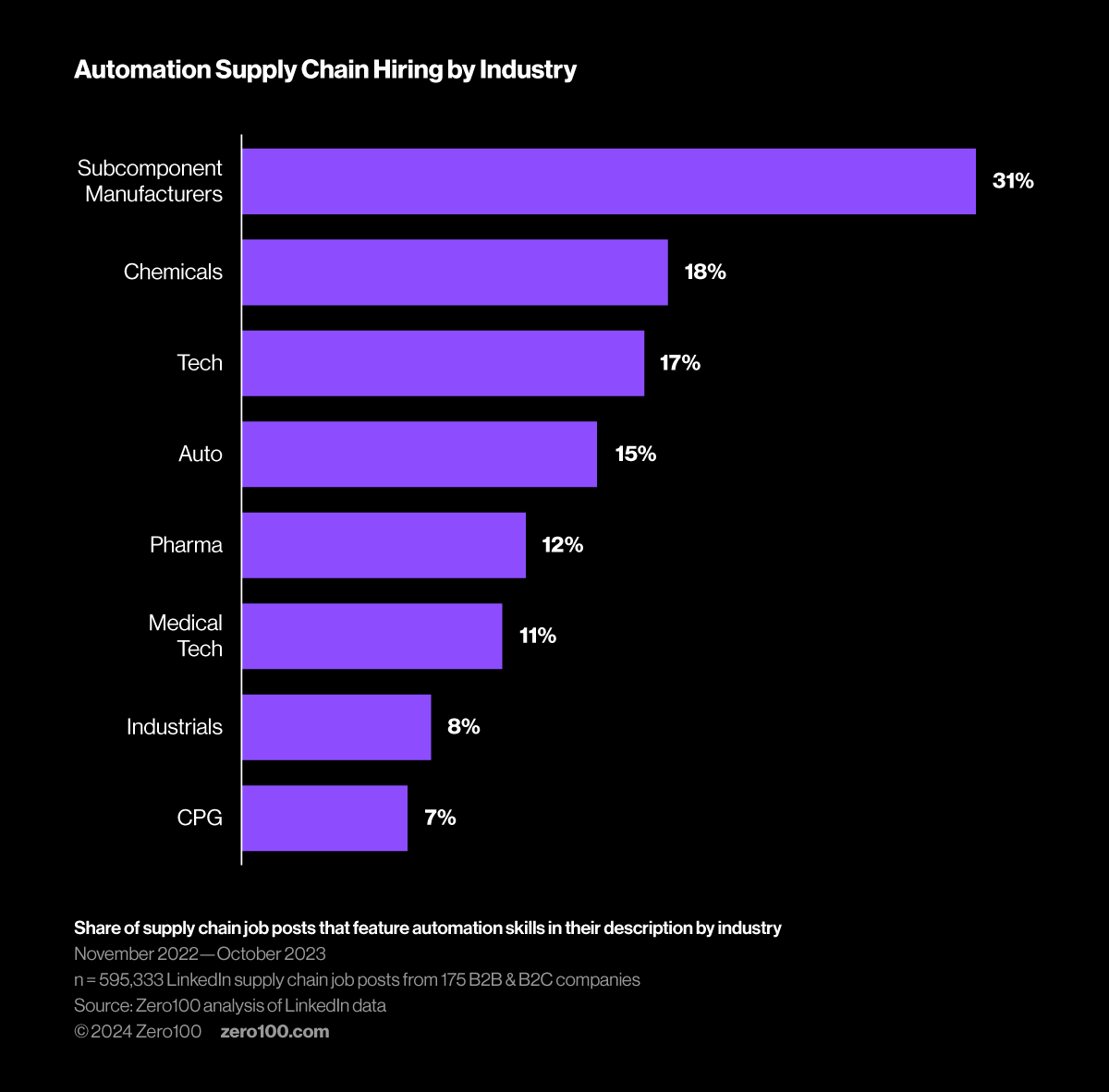

A Quarter of Supply Chain Automation Jobs Require Software Engineering. Are You Ready?
Automation combined with AI/ML, analytics, and other digital technologies is the future of supply chain automation. Who's leading the way on hiring for this skill and what does it take to support digital automation at a foundation level?
Key Takeaways
-
1
9% of supply chain job posts (across 175 B2B and B2C companies) require automation skills.
-
2
The top three companies for automation hiring in supply chain are: Emerson (72% of job posts), Schneider Electric (65%), and General Motors (37%). B2B companies hire for automation roles at almost twice the rate of B2C companies (12% vs 7%).
-
3
At an industry level, subcomponent manufacturers feature automation in job posts the most (31% of jobs), followed by chemicals (18%), technology (17%), and auto (15%).
Automation combined with AI/ML, analytics, and other digital technologies is the future of supply chain automation. Digital automation drives increased efficiency, cost reduction, and more sustainable supply chain practices. Predictive maintenance, machine vision, IoT sensors, robotics, and more all enable these operational improvements.
This advanced automation occurs across all supply chain functions, although manufacturing is its homeland. When looking at LinkedIn job hiring, 58% of manufacturing jobs require automation – over double that of the next function (logistics, 22%). As a result, high-process and manufacturing industries seek automation skills more than other industries. B2B companies hire for automation roles at almost twice the rate of B2C companies. At the industry level, subcomponent manufacturers mention automation in 31% of jobs posts, followed by chemicals at 18%.

A quarter of automation job posts also feature software engineering. This makes sense, as employees need to build and maintain the underlying software that drives automation. This is followed by analytics (17%) and AI/ML (13%). Emerson hires for the most automation roles (72% of supply chain job posts) and has a whole range of automation software solutions, which increase plant performance when combined with relevant machinery for intelligent control of processes, power, water, and renewables.
An Emerson job post for an Advanced Manufacturing Engineering Manager calls for someone who “oversee[s a] team that designs, developments, implements, and supports software and hardware solutions that enable and enhance manufacturing operations…strategically plan[s] the automation roadmap for operations transformation from manual process to automation…understand[s] automation systems, mechanical engineering, robotics, plcs, data collection systems…[and who has a] knowledge of programming: c/c++/c#, visual basic, .net, sql and/or other languages.”
Behind Emerson is Schneider Electric, who require automation in 65% of their supply chain job posts. They have a whole range of warehouse automation software that can handle higher demand with less energy, staff, and resources. This software, with its combined sensors and control systems, works in harmony with physical robots to improve both warehousing and manufacturing.
Over a third (36%) of leading pharmaceutical distributor McKesson's supply chain job posts reference automation. The same automated technology that enables their distribution centers (DCs) to pick, pack, and ship medications to customers faster also helps reduce redundant and labor-intensive work, optimize employees’ productivity, and allows them to focus on more meaningful work that advances their skills. In one of its largest DCs in Ohio, 90% of all fulfilment processes have been enhanced by automation.
To support digital automation, it is vital to invest time in training programs, workshops, and online courses to enhance employees’ capabilities with new technologies, as well as to understand their purpose. In addition to these trainings, seek out candidates with a problem-solving mindset so that they are able to troubleshoot technical issues, optimize algorithms for better performance, and collaborate cross-functionally. Other skills to develop internally are software engineering and analytics as these are complementary – and required – to advanced automation.
To see a different data cut or to dig deeper into this topic, reach out to our Head of Research Analytics, Cody Stack, at Cody.Stack@zero100.com.
Methodology
Zero100’s proprietary data and analytics are a combined effort between our data scientists and research analysts. We provide data-first insights matched with our own research-backed points of view and bring this analysis to life via real-world case examples being led by supply chain practitioners today.
For this study, we looked at 2.8 million LinkedIn job posts from 175 B2B and B2C companies. Our analysis categorizes listings based on mentions of specific digital skills within job titles and descriptions.